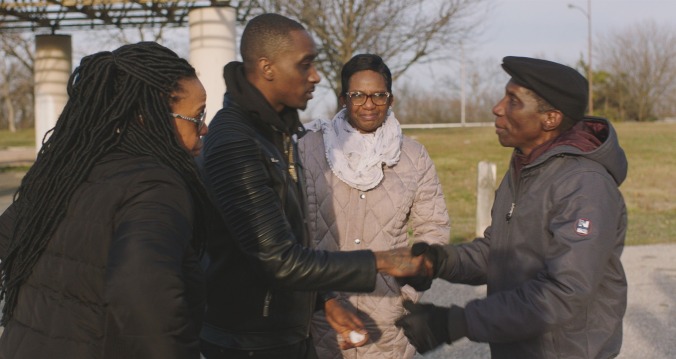Derrica Wilson, Natalie Wilson, and Derrick Butler with a community member Photo: HBO
HBO’s new four-part documentary Black And Missing showcases the inspirational stories of Black people searching for their missing loved ones, but offers more than just feel-good advocacy. Created by Emmy winners Soledad O’Brien and Geeta Gandbhir, the docuseries unflinchingly confronts a system that doesn’t always believe that Black lives matter.
A common right-wing response to the Black Lives Matter movement was to bring up unrelated crime in Chicago, as if Black people only care about violence in their communities if they can blame the police. Black And Missing explicitly debunks that argument, as Gandbhir and O’Brien focus on Derrica and Natalie Wilson, co-founders of the Black And Missing Foundation, which works to raise awareness for missing people of color.
But, wait, isn’t that racist? Don’t all missing lives matter? Gandbhir and O’Brien challenge this sophistry head on: More than 540,000 people went missing in 2020, including more than 200,000 people of color. Cases involving missing Black people remain unresolved four times longer than those of missing white people.
O’Brien boasts an impressive 30-year career in journalism, but she doesn’t shy away from calling out media bias and sloppy reporting. (She’s sort of a Twitter media ombudsman.) Black And Missing specifically targets what’s become known as “Missing White Woman Syndrome,” where victims who fit a certain demographic profile receive disproportionate news coverage. If a white woman is reported missing, it’s a national tragedy, but when women of color vanish, it’s treated like a mere statistic.
The recent disappearance of 22-year-old Gabby Petito only serves to bolster the point: Petito, who was white, went missing in Wyoming; yet over the past decade, 710 Indigenous people were reported missing in the state. Unlike Petito, whose disappearance was national news, it’s unlikely you could name any of those 710 human beings based on media coverage.
Tamika Huston was reported missing in 2004 from Derrica Wilson’s hometown of Spartanburg, South Carolina. Huston’s aunt, Rebkah Howard, describes how she struggled to get the media and even law enforcement interested in Huston’s disappearance, despite her own background in public relations. Meanwhile, there was almost round-the-clock media coverage at the time of Natalee Holloway, who was young and photogenic like Huston, but also white and blonde. This blatant discrepancy is what inspired the Wilson sisters to start the Black And Missing Foundation.
The docuseries contrasts the all-hands-on-deck response from the public when a white woman is reported missing with the active disinterest when the victim is a person of color. The families and communities of these victims also face a ticking clock, but they don’t control the newsrooms. The Wilsons help organize on the ground while pressuring the media and local law enforcement.
Missing Black people, even children, are disproportionately considered runaways, which means vital time is lost in their search. Runaway children don’t receive an Amber Alert, for instance. In an interview, Vince Warren, executive director at the Center For Constitutional Rights, compares this to how American institutions responded when Black people ran away from enslavement. The full force of the law was devoted to their recovery. No expense was spared. Now that they are no longer someone else’s “property,” they seemingly aren’t worth the bother.
Of course, Black lives have always mattered to those closest to them, and Black And Missing offers a heartfelt look at the people left behind. Despite the odds, these friends and relatives get up each morning and continue the search for their loved ones. They never give up hope, even while battling a callous system that should exist to help them. The documentary follows Black And Missing member Derrick Butler, whose sister Pam Butler disappeared in 2009. Pam’s absence left a gaping hole in Derrick’s life, and it’s clear that he can’t fully participate in the present, let alone consider the future, until he’s resolved this trauma from his past.
There’s an agonizing point when families must accept that their missing loved one is likely dead, and all they have left to fight for is closure. Distraught families frequently plead with those responsible: They just want to bring their loved one home, to bury them. This sometimes involves making deals with the devil, in which their loved one’s killer receives a reduced sentence in exchange for revealing where they disposed of the remains. This is the final indignity, as murderers barter with the life that they stole.
Documentaries covering this type of subject matter are tricky, because the future doesn’t guarantee happy endings or even catharsis. But Black And Missing, filmed over three years, delivers both for Derrick Butler, if obviously bittersweet. You can sense the relief when Butler learns that his sister Pam’s killer, Jose Rodriguez-Cruz, has received justice, but he still feels righteous rage that the man was free to prey on her in the first place.
Cruz’s first wife, Marta Haydee Rodriguez, whom he also murdered, disappeared a decade before he met Pam. If the system had acted swiftly when one woman of color vanished, the documentary observes, perhaps that might’ve spared another.
Black And Missing deftly achieves a critical balance between celebrating the Wilson sisters’ successes and highlighting the systemic failures that make their work necessary. Yes, there are good cops and admirable prosecutors who go the extra mile, but they are clearly the exceptions. The larger problem persists and demands resolution before more women of color are lost forever.









































